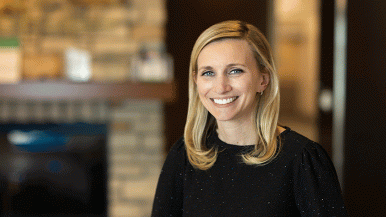Some 10% of cancers may be hereditary. And thanks to genetic testing, you can now determine your risk.
Nurse practitioner Hillary Knowles, DNP, provides hereditary cancer genetic testing for patients at the RUSH Copley Cancer Care Center. She identifies those who have an increased risk of cancer, helps them understand their risk and — perhaps most important — offers ways to reduce that risk.
“We can help identify those who need to be screened early,” says Knowles. Early screening allows patients to catch and treat cancer early, when it is most curable.
The impact of the testing goes beyond the individual patient, Knowles explains. Because it’s genetic, if a mutation is identified, the patient’s children have a 50% chance of carrying that gene.
“It helps family members to know they should be screened early as well,” she notes.
Qualifying for genetic testing
Knowles reviews a patient’s personal and family history to see if they qualify for genetic testing. Criteria include a diagnosis of cancer at a young age, a history of a rare cancer such as pancreatic cancer, and multiple cancers in the family. If a patient qualifies, she explains why they qualify, the process and if insurance covers the testing. Most of the time, the test is covered, she says, but if it isn’t, the patient may choose the self-pay option of $250. The test is typically a blood test, although some screenings use saliva.
If the result is positive, she tells the patient which gene they inherited and which cancer or cancers they are at increased risk for from a list of 11 different cancers. Ways to reduce their risk range from dietary changes and increased monitoring to medications and even surgery.
“We discuss what it means for them,” Knowles says.
Reducing the risk
In many cases, it means monitoring and surveillance. She may refer the patient to a provider to be monitored more frequently — directing a patient with an increased risk of breast cancer to the high risk breast clinic for a mammogram or MRI or a patient with an increased risk of colon cancer to a GI doctor for a colonoscopy. Sometimes, she refers patients to a nutritionist or dietitian to recommend cancer-preventing diets.
A patient could also opt to receive prophylactic chemotherapy medications. In some cases, the patient may choose a surgical procedure to prevent cancer, like a mastectomy or hysterectomy.
Sometimes, the result of the genetic testing is negative. While this is good news, it doesn’t mean the person has no chance of getting cancer. With a negative result, she typically recommends continued screening for the patient, based on family history.
“Our patients are very appreciative of the information and follow-through,” Knowles says. She is passionate about her role educating patients and helping in cancer prevention.
“Genetic testing is so important,” she says, “because of the implications for early diagnosis and for the family — siblings and children — who benefit from this knowledge and can prevent cancer.”




